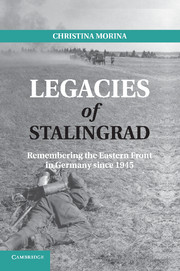Conclusion
Published online by Cambridge University Press: 07 October 2011
Summary
The war is not over as long as there is one wound still bleeding from it.
Heinrich BöllPostwar German political culture cannot be properly understood without considering the impact the experience of war and its aftermath had on German society. Whereas historians thus far have focused on studying the memory of German suffering and the Holocaust, this study has demonstrated how central the Eastern Front memory was in German postwar political culture on both sides of the Iron Curtain. The memory of the war against the Soviet Union was a politicum from the very beginning. With the division of Germany in the wake of the Cold War, remembering the Eastern Front, especially German crimes committed in the Soviet Union and Eastern Europe between 1941 and 1945, posed an immense challenge to the emerging political elites. In the GDR, the SED’s monopoly over the interpretation of history secured for the war on the Eastern Front the most prominent position in the political memory of World War II. In the FRG, in contrast, it took the political leadership decades to formulate a critical Eastern Front memory. Thus, the “divided memory” (Jeffrey Herf) of the Holocaust corresponded with the opposing interpretation of the war in the East. In as much as the SED marginalized the mass murder of the Jews and instead focused on the Soviet Union as Hitlers prime victim and conqueror, West German politicians in turn marginalized the criminal dimension of the Eastern Front and instead, over time, placed the Holocaust at the center of official narratives about Germany’s role in World War II.
The long-term view and comparative perspective of this study has highlighted the fact that over the course of half a century, the experience of war and total defeat has had a decisive impact on German society and politics. The brutalization of warfare that took place on the Eastern Front between 1941 and 1945, in the course of which Germans not only experienced mass death but were first and foremost “those who did the killing,” was the main source of the “stigma of violence” in postwar German memory of the Third Reich. This stigma explains the “difficulty of ending the war” (Heer) on the Eastern Front in either Germany. Coming to terms with this legacy while oscillating between the sufferings Germans have inflicted on others and the losses incurred by Germans themselves, was a major political, intellectual, and emotional challenge for Germany’s political elite.
- Type
- Chapter
- Information
- Legacies of StalingradRemembering the Eastern Front in Germany since 1945, pp. 262 - 268Publisher: Cambridge University PressPrint publication year: 2011



